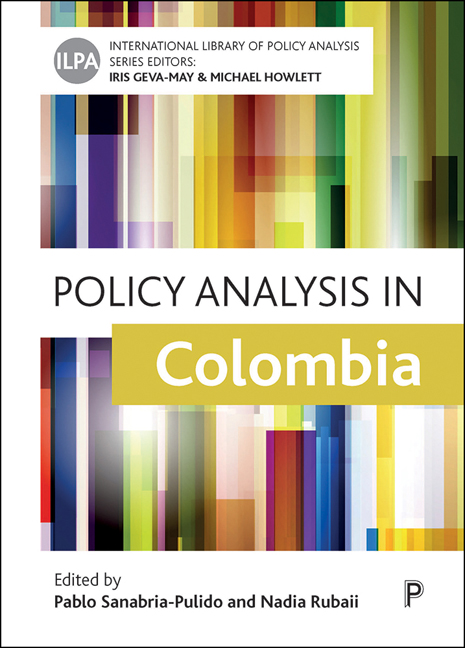Book contents
- Frontmatter
- Dedication
- Contents
- List of Figures and Tables
- List of Abbreviations
- Notes on Contributors
- Editors’ Introduction to the Series
- Policy Analysis in Colombia: An Introduction
- Part One Policy Analysis in Contemporary Colombia
- One The policy Analysis Movement in Colombia: The State of the Art
- Two Evolution of Policy Analysis as a Field of Study and Instruction in Colombia
- Three Policy Analysis, Bureaucratic Capacity and Public Administration Reforms in Colombia
- Part Two Policy Analysis within National and Subnational Governments
- Four Policy Analysis Inside Central Government in Colombia
- Five Policy Analysis and the Legislature in Colombia
- Six Policy Analysis in the Colombian Constitutional Court
- Seven Metropolitan Governance and Policy Analysis in Colombia
- Eight Policy Analysis for Decision Making in Colombian Local Governments
- Part Three Policy Analysis in Key Policy Domains
- Nine Policy Analysis in the Education Sector in Colombia
- Ten Policy Analysis in the Health Sector in Colombia
- Eleven Policy Analysis and Decision Making in the Military Forces: The Havana Experience
- Twelve Technocracy, Decision Making and Economic Policy in Colombia
- Thirteen Social Policy, Target Populations and Policy Analysis in Colombia
- Part Four Policy Analysis Beyond the State
- Fourteen Political Parties and Policy Analysis in Colombia
- Fifteen Policy Analysis and NGOs in Colombia
- Sixteen Media, Evidence and Policy Analysis in Colombia
- Conclusion: Building Capacity for Policy Analysis Amid Tensions and Challenges in Colombia
- Index
Seven - Metropolitan Governance and Policy Analysis in Colombia
Published online by Cambridge University Press: 10 March 2021
- Frontmatter
- Dedication
- Contents
- List of Figures and Tables
- List of Abbreviations
- Notes on Contributors
- Editors’ Introduction to the Series
- Policy Analysis in Colombia: An Introduction
- Part One Policy Analysis in Contemporary Colombia
- One The policy Analysis Movement in Colombia: The State of the Art
- Two Evolution of Policy Analysis as a Field of Study and Instruction in Colombia
- Three Policy Analysis, Bureaucratic Capacity and Public Administration Reforms in Colombia
- Part Two Policy Analysis within National and Subnational Governments
- Four Policy Analysis Inside Central Government in Colombia
- Five Policy Analysis and the Legislature in Colombia
- Six Policy Analysis in the Colombian Constitutional Court
- Seven Metropolitan Governance and Policy Analysis in Colombia
- Eight Policy Analysis for Decision Making in Colombian Local Governments
- Part Three Policy Analysis in Key Policy Domains
- Nine Policy Analysis in the Education Sector in Colombia
- Ten Policy Analysis in the Health Sector in Colombia
- Eleven Policy Analysis and Decision Making in the Military Forces: The Havana Experience
- Twelve Technocracy, Decision Making and Economic Policy in Colombia
- Thirteen Social Policy, Target Populations and Policy Analysis in Colombia
- Part Four Policy Analysis Beyond the State
- Fourteen Political Parties and Policy Analysis in Colombia
- Fifteen Policy Analysis and NGOs in Colombia
- Sixteen Media, Evidence and Policy Analysis in Colombia
- Conclusion: Building Capacity for Policy Analysis Amid Tensions and Challenges in Colombia
- Index
Summary
Introduction
The process of urbanization of Colombia has led to the configuration of a highly urbanized country with a large number of urban centers across most of its territory and four different cities as main development poles. Alongside these urban centers, greater urban agglomerations have developed, creating new scales of urban interaction but also a new scope for wicked problems. Namely, Colombia has nowadays at least four metro-regions of more than two millions inhabitants, six metropolitan areas exceeding one million inhabitants and 24 metro-regions with more than 250,000 in habitants, a rare situation in the Latin American context where most countries’ populations tend to be concentrated in the capital city, with the exceptions, perhaps, of Brazil, Ecuador and Mexico. This has put Colombia in a good position to experiment with policy instruments related to metropolitan coordination for more than 50 years, creating several natural policy experiments whose results are of interest to policy scholars around the world.
Indeed, there are several policy areas such as environmental policy, transportation, land policy and zoning, and housing policy, where it is possible to witness a growing trend in the use of metropolitan instruments in order to address problems that go beyond municipal boundaries. In spite of these developments, formal metropolitan administrative structures, and greater use of metropolitan instruments to solve policy problems, are still unevenly distributed in Colombian cities. For instance, of the three larger cities, only one has a formal, solid, metropolitan government. Likewise, only six of the 24 metro-regions with more than 250,000 inhabitants have a formal metropolitan government structure. The lack of coherence of these administrative structures has proven to be an obstacle for policy consolidation, since the few cases of metropolitan governments that are in place remain as isolated local experiments, with very little action on the part of the national government to create a national policy framework for learning from these examples and create an suitable approach to metropolitan governance and interjurisdictional collaboration/intermunicipal cooperation.
The low level of consistency in metropolitan policies in Colombia shows that although a legal framework for the constitution of metropolitan governments has existed since the late 1970s, very few processes have led to the eventual consolidation of a metropolitan government structure.
- Type
- Chapter
- Information
- Policy Analysis in Colombia , pp. 113 - 134Publisher: Bristol University PressPrint publication year: 2020



